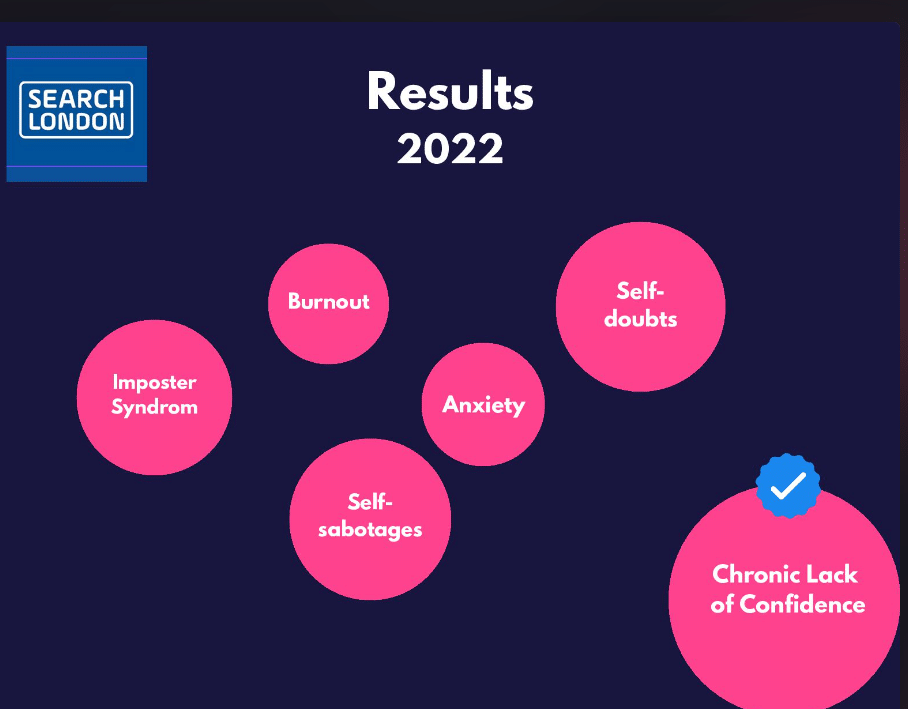
I have spent most of my life feeling driven by the idea that I am not enough.
Whether I’m applying for an award or talking about my career with someone over drinks, I don’t really feel comfortable listing my accomplishments.
Even writing this article, I don’t feel my voice is particularly useful or cogent.
Of course, I don’t just let these feelings win. I sit with them, challenge them, and try to write or say the words my feelings deny. And I know I’m not alone.
These emotions are the classic markings of “imposter syndrome,” a term bandied about corporate offices almost as often as words like “synergy” or “optimization.” And at this point, everyone in the digital marketing industry has heard of imposter syndrome.
I surveyed over 150 digital marketers online, and 90% of the responses were positive: “Yes, I have experienced imposter syndrome in my digital marketing career.”
I’m writing an article for @sengineland about the infamous imposter syndrome.
Have you ever experienced imposter syndrome in a digital marketing job?
— Harmony Huskinson
(@hhuskins) June 12, 2023
I ran two polls that confirmed the overwhelming experience of Imposter Syndrome – with 85% of Twitter respondents and 97% of LinkedIn respondents saying they experienced it in a digital marketing job.
So, mostother people in digital marketing also feel like they aren’t enough.
We’re all silently berating ourselves, exhausted by self-doubt and internal criticism.
But why? Why do so many people feel like they’re trapped in the deepest well of their personal misgivings? How can we get out?
I spoke with numerous professionals in the digital marketing industry about their experiences with imposter syndrome, and I’ve uncovered three perspectives to consider when you’re facing imposter syndrome:
Remember: Imposter syndrome won’t just disappear. It’s not an on-off switch. But our awareness of its place in our lives is crucial to managing it.
1. Look within
When imposter syndrome is defined in various papers, online forums, and discussions with my peers, it’s usually described as a feeling. It’s an emotion rooted in one’s sense of lacking, unbelonging, and inherent deficiency.
“It’s a feeling of discomfort, of agitation – it’s not a nice feeling,” Tazmin Suleman said.
A former SEO analyst, Suleman now runs a business coaching SEO practitioners on their confidence at work and in their personal lives.
She has dedicated her career to combating imposter syndrome in the SEO industry through mindfulness training and soft skills growth. After being laid off amid the pandemic, Suleman knew it was time to direct her energy toward helping others overcome their doubts.
“If you get something wrong and say horrible things about yourself – which you wouldn’t say to someone else – how can you trust yourself?” Suleman said.
Growing as a person isn’t about critiquing oneself to the point of exhaustion but giving yourself enough grace to learn and grow.
Suleman acknowledges that it can feel impossible to keep up in an industry beleaguered by algorithm updates, legal rulings, and the latest technical buzz (read: AI).
“You can learn and learn and learn, but the thing that’s going to make you progress is action. And the way to take action is to feel confident,” Suleman said.
Information about the SEO industry flows infinitely, but one’s empowerment from that information can only be found by turning inward.
Imposter syndrome begets burnout
When left unchecked, imposter syndrome inevitably mutates into .
When a person doesn’t feel like they’re enough, they don’t have to care about depleting their energy, relationships, or sense of self. It’s easier to be a machine when you ignore the body’s warning signs.
Adrijana Vujadin, SEO manager at Affirma, was driven by her burnout to examine imposter syndrome and find a way past it.
“I was hoping that one day I would open my laptop and just feel good about myself. But that didn’t happen. It was just more frustrations, more negative thoughts, more sabotaging,” Vujadin said.
She didn’t listen to her body’s anxiety attacks, ending her days covered in sweat from stress.
“I was ready to quit even my career, my job, because I realized that my mental health and the health of my body has been impacted by my work,” Vujadin said of her SEO career.
Then she took a break and read some books about taking control of her thoughts. One year later, she’s leading a talk at Search London called “How to be SEO Confident.”

Vujadin took the time to rest and began to realize that none of the work she does in SEO matters if she’s driven to the brink of exhaustion.
“Ninety-nine percent of people are talking about technical things and years of experience,” but this isn’t enough, Vujadin said. People can have 20+ years of experience and still feel imposter syndrome.
By posing a few questions toward one’s self-talk, a person can gain confidence and find meaning in their career:
Questions to pose against imposter thoughts
- Is this thought useful?
- Is this thought accurate?
- How many times in the past have you proven yourself good enough, despite thinking you weren’t?
These questions posed by Vujadin have helped her emerge from her lowest point to her current recognition as a stronger, more confident strategist.
Get the daily newsletter search marketers rely on.
See terms.

Leave a Reply